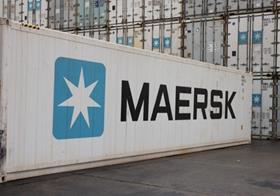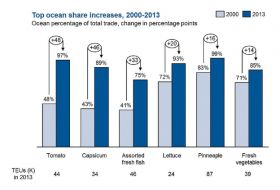
In a new study, transportation consultancy Seabury has announced it has found a pronounced shift is taking place from air cargo to ocean transport, with new container technologies contributing to the trend.
“A decade ago, tomatoes were just as likely to be transported by air as in a reefer container,' explained Derek Brand, Seabury's maritime advisor and author of the report. 'Today, tomatoes are transported almost entirely in containers. The same holds true for numerous other perishable commodities.'
According to the study, some 100,000 TEU per year is transported by ocean carriers instead of airplane, a shift that is particularly pronounced in certain perishable commodities like tomatoes, capsicum, fresh fish, lettuce and pineapples, but not only perishables.
“The volumes that have shifted to ocean transport are significant for the air cargo industry,” Brand continued.
If there had been no mode shift since the year 2000, 5.4M tonnes of cargo would still be transported by air rather than ocean. Air cargo should have grown at an average annual rate of 4.5 per cent, but has instead grown at 2.6 per cent.
“New technology in controlled atmosphere containers, such as Star Cool CA, has the potential to further increase the trend,' he noted. 'CA’s ability to slow down the ripening process opens up ocean transport as a viable alternative to air cargo on some of the longer trade routes.'
For Maersk Container Industry (MCI), the maker of Star Cool CA, this is a positive development.
“As new trades open up our customers can improve their business,' said Anders Gamborg Holm of MCI sales and marketing. 'Add to that carbon emissions savings by almost a factor of 50 when you compare air and sea transport.
'We have been on the market with CA for five years now,' he added. 'It’s reliable and affordable, and we predict it will make further inroads in the market.”



